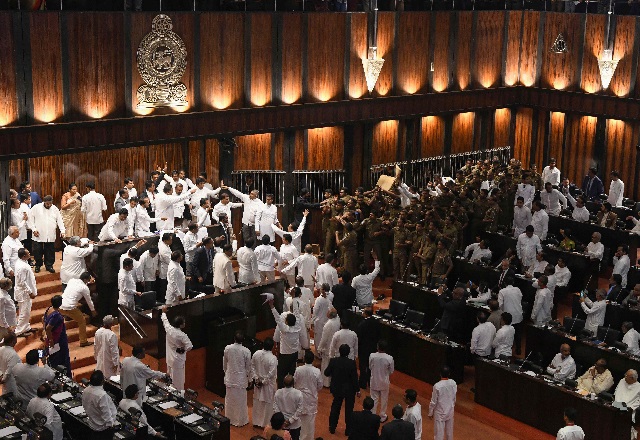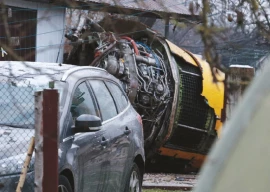
The Indian Ocean nation has been paralysed since October 26 when President Maithripala Sirisena sacked Ranil Wickremesinghe as premier and replaced him with former strongman Mahinda Rajapakse.
Speaker Karu Jayasuriya was blocked from taking his chair for almost an hour by a group of legislators and was only able to take his place after he entered the assembly ringed by unarmed officers and parliamentary staff.
Sri Lanka has no PM or cabinet after no-confidence vote: parliament's Speaker
They then tried to shield Jayasuriya as supporters of Mahinda Rajapakse, who lost a vote of no confidence as prime minister on Wednesday, pelted him with books and stationery.
MPs broke furniture and attacked officers and some Rajapakse loyalists were also seen throwing chilli powder at rival legislators and police.
Gamini Jayawickrema Perera, a legislator from ousted prime minister Ranil Wickremesinghe's party, said chili mixed water was thrown at his face and he later required treatment in the parliament's medical centre.
On Thursday punches were thrown in parliament, deepening international concern with the German ambassador to the island nation saying it was "unbecoming of a democracy".
Day-to-day administration in Sri Lanka remains paralysed as the crisis drags on.
Sri Lanka Supreme Court restores sacked parliament
Parliament reconvened on Wednesday and lawmakers approved a motion of no-confidence in what they called Rajapakse's "purported" cabinet, also passing motions declaring Sirisena's moves illegal.
Sirisena on Thursday asked parliament to amend and re-submit the no-confidence motion.
On Thursday MPs moved another resolution against Rajapakse, this time to reject his call for snap elections.
Speaker Jayasuriya said he will reconvene parliament on Monday for routine business.



1732626034-0/BeFunky-collage-(92)1732626034-0-165x106.webp)


1732618327-2/Untitled-design-(7)1732618327-2-270x192.webp)










COMMENTS
Comments are moderated and generally will be posted if they are on-topic and not abusive.
For more information, please see our Comments FAQ